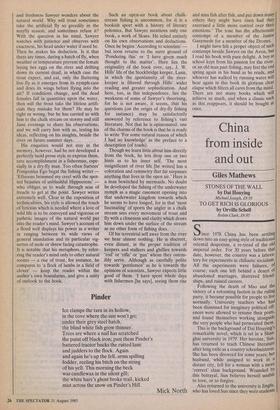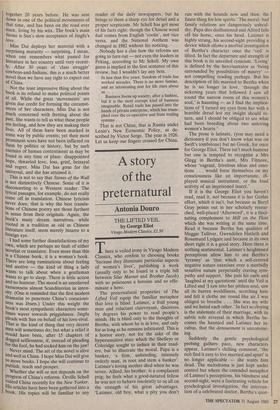China from inside and out
Giles Mathews
STONES OF THE WALL by Dai Houying
Michael Joseph, f9.95
TO GET RICH IS GLORIOUS by Orville Schell
Robin Clark, f9.95
Since 1978 China has been settling down into an easy-going style of traditional oriental despotism, a re-tread of the old imperial order. For 30 years before that date, however, the country was a labora- tory for experiments in chiliastic socialism• All the experiments were failures, of course; each one left behind a desert of abandoned marriages, shattered friend- ships, and ruined careers.
Following the death of Mao and the victory of a reforming faction in the ruling party, it became possible for people to live normally. University teachers who had been dismissed for imaginary political off- ences were allowed to resume their posts, and found themselves working alongside the very people who had persecuted them• This is the background of Dai Houying's remarkable novel, which is set in a Shan- ghai university in 1979. Her heroine, Sun, has returned to teach Chinese literature after long exile as a country schoolmistress. She has been divorced for some years; her husband, while assigned to work in a distant city, fell for a woman with a more `correct' class background. Wounded by this betrayal, Sun believes herself unable to love, or to forgive. Also returned to the university is Jingfu, who has loved Sun since they were students together 20 years before. He was sent down in one of the political movements of that time, and has been on the road ever since, living by his wits. The book's main theme is Sun's slow acceptance of Jingfu's love.
Miss Dai deploys her material with a surprising maturity — surprising, I mean, when one remembers what passed for literature in her country until very recent- ly. After 30 years of 'class struggle' cowboys-and-Indians, this is a much better novel than we have any right to expect out of China.
Not the least impressive thing about the book is its refusal to make political points at all. While the great `movements' are given due credit for forming the circumst- ances of her characters, Miss Dai is not much concerned with fretting about the past. She wants to tell us what these people are feeling, and how they are making their lives. All of them have been marked in some way by public events; yet their most prominent scars have not been inflicted on them by politics or history, but by such enemies of human contentment as may be found in any time or place: disappointed hope, thwarted love, loss, grief, betrayal and regret. Miss Dai has gone for the universal, and she has attained it.
This is not to say that Stones of the Wall Is not distinctively Chinese. Some of it is disconcerting to a Western reader. The lYrical passages, for example, do not really come off in translation. Chinese lyricism never does; that is why the best transla- tions of Chinese poetry are those furthest In sense from their originals. Again, the book's many dream narratives, while rooted in a tradition as old as Chinese literature itself, seem merely bizarre to a foreign eye. I had some further dissatisfactions of my own, which are perhaps no fault of either novelist or translator. Even more than this is a Chinese book, it is a woman's book. There are long ruminations about feeling and motive — the kind of thing a lady wants to talk about when a gentleman wants to go to sleep. There is little action and no humour. The mood is an unrelieved earnestness almost Scandinavian in inten- sity. (One is reminded that the first modern dramatist to penetrate China's conscious- ness was Ibsen.) Under this weight the book's most sympathetic characters some- times waver towards priggishness. Jingfu pleads with Sun on behalf of his love-rival. That is the kind of thing that very decent men will sometimes do; but what a relief it would have been, after 15 chapters of dogged selflessness, if, instead of pleading for the fool, he had socked him on the jaw! Never mind. The art of the novel is alive and well in China. I hope Miss Dai will give us more books. I hope she will continue to Publish, teach and prosper. Whether she will or not depends on the progress of China's reforms. Orville Schell visited China recently for the New Yorker. His articles have here been gathered into a book. His topics will be familiar to any reader of the daily newspapers, but he brings to them a sharp eye for detail and a proper scepticism. Mr Schell has got most of his facts right: though the Chinese word kuli comes from English 'coolie', not vice versa, and the National Anthem was changed in 1982 without his noticing.
Nobody has a clue how the reforms are going to turn out — not even the leaders in Peking, according to Mr Schell. My own guess is implied in the first sentence of this review, but I wouldn't lay any bets.
In less than five years, freedom of trade has worked miracles. There is no more famine, and an intoxicating zest for life rises about us . .
Business livens up society, after a fashion, but it is the most corrupt kind of business imaginable. Retail trade has passed into the hands of private enterprise, which has trium- phed over the co-operative and State trading systems . . .
That is not China; that is Russia under Lenin's New Economic Policy, as de- scribed by Victor Serge. The year is 1926. Let us keep our fingers crossed for China.











































 Previous page
Previous page